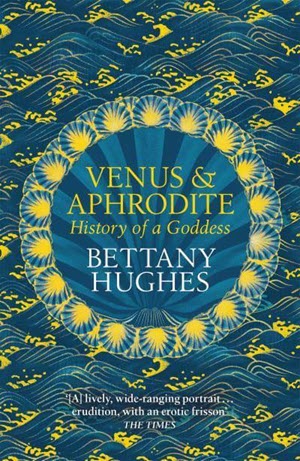Venus & Aphrodite
 Readers in the UK will doubtless be familiar with Bettany Hughes from her many, many TV shows about various aspects of ancient history. Those of you in the rest of the world may not know her at all, but please be assured that she’s popular here, and also knows what she is talking about.
Readers in the UK will doubtless be familiar with Bettany Hughes from her many, many TV shows about various aspects of ancient history. Those of you in the rest of the world may not know her at all, but please be assured that she’s popular here, and also knows what she is talking about.
Of course that’s not the only reason she is popular. Gentlemen of my acquaintance often seem fond of her in the same way they are fond of Nigella Lawson. I like both of them for a related reason in that, while both clearly class as celebrity women, neither has succumbed to the anti-trans virus that has run riot amongst the chattering classes here in the UK. Indeed, Hughes seems to have had some similar thoughts about the ancient world to those I have, especially with regard to Nero’s Empress Sabina. That, however, is another story. This is a book about a goddess.
The title of the book, Venus & Aphrodite, mentions two goddesses. While the Greek and Roman versions of our subject share very many similarities, they are not identical. Indeed even within the Greek and Roman worlds, each of the two shows variation through both time and space. That should not surprise us. After all, the Jesus who inspired people to submit to being thrown to the lions in Rome is not the same Jesus for whom the Pope is Vicar on Earth, or the same Jesus who is invoked by Republican senators in the USA.
However, they are not that different either. For Hughes, the Venus and Aphrodite of Rome and Greece are simply successful instances of the Goddess of Love on her long journey from Sumer to the present day. The book begins with Inanna and ends with Beyoncé, with many calling points in between.
This is not an academic book. There are a number of interesting questions I would have liked to ask about how this version of the goddess has changed on her journey. Why have her martial qualities been passed to Athena and Artemis? Why has her fondness for queers been passed to Cybele? But this is a book aimed at the general reader. Like Hughes more recent TV series, it eschews academic debate for easily accessible and simple ideas. But, having been written by someone who does understand the academic debate, it is well-rooted in deeper knowledge.
Pleasingly, the book is not entirely straight. After all, Cyprus, which Aphrodite calls her home, is also home to that most unusual of Graeco-Roman gods, Hermaphroditus. The ancient Cypriots seem to have had a particular interest in this dual-sexed being, perhaps stretching back to before the influence of Astarte reached the island.
Mostly, however, this is a book about the continuing interest of humankind in female divinity, of how that waxes and wanes with different cultures, and different levels of patriarchal control, and of the chaos that love, and lust, cause in human relations.
It is, I think, a very neo-pagan book.

Title: Venus & Aphrodite
By: Bettany Hughes
Publisher: Orion
Purchase links:
Amazon UK
Amazon US
Bookshop.org UK
See here for information about buying books though Salon Futura